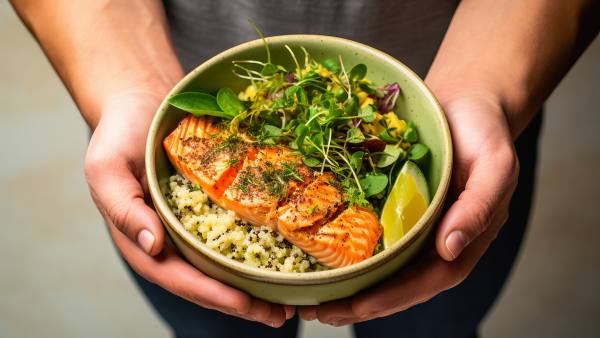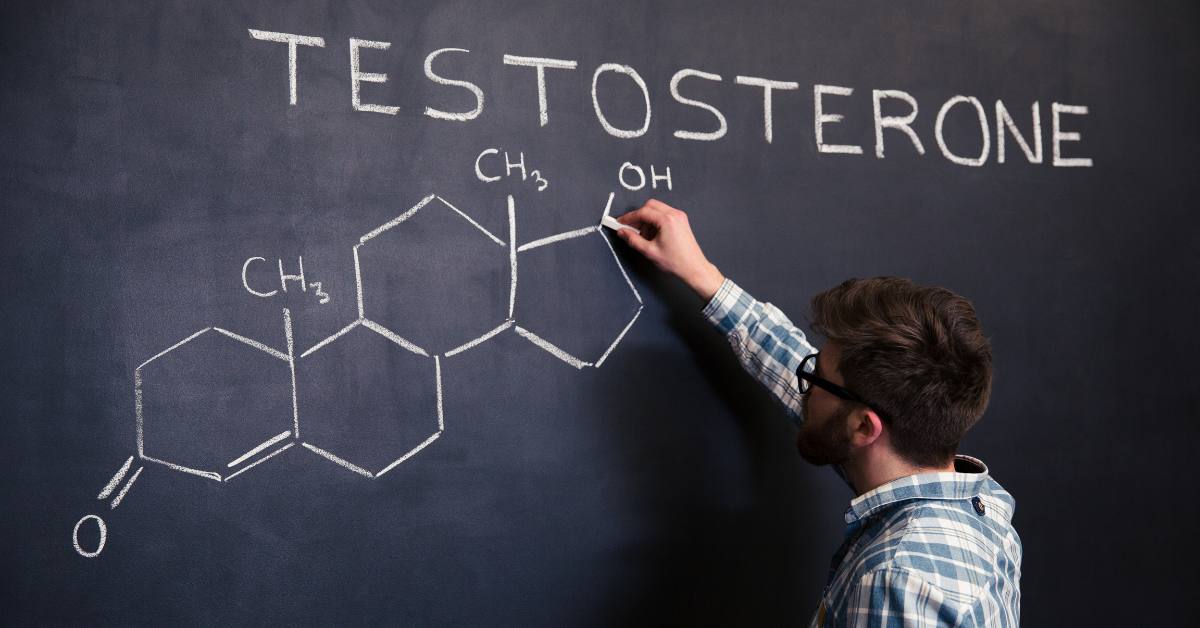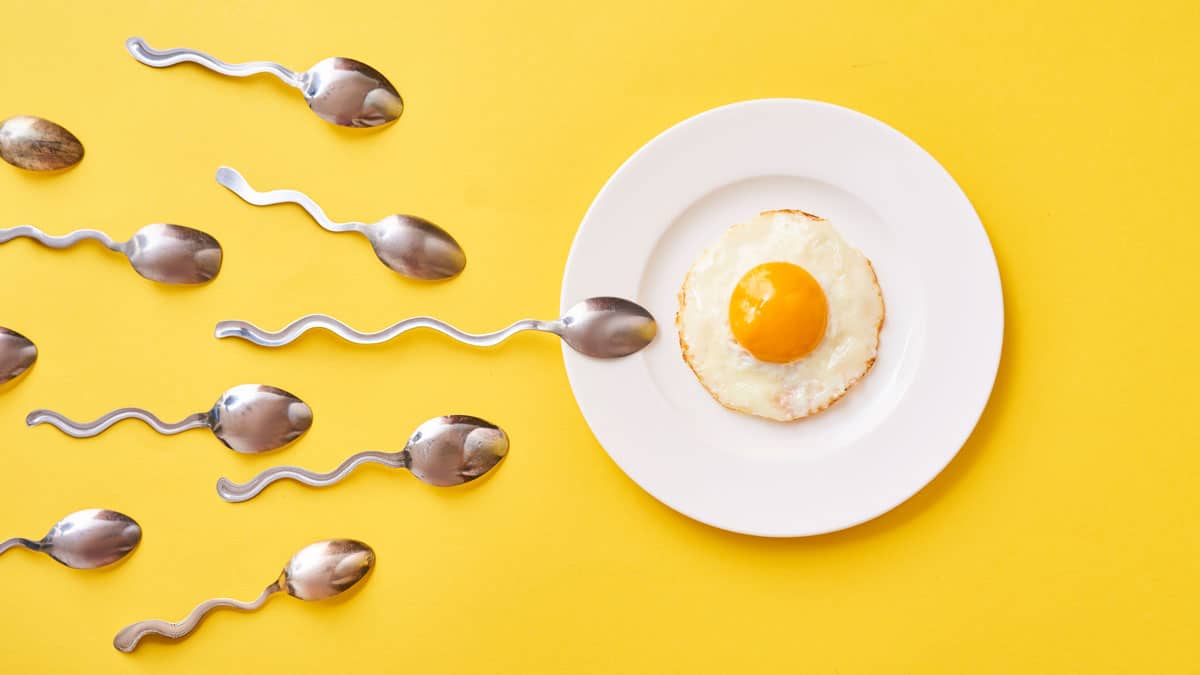Testosterone is an important hormone for men. It affects a diverse range of functions in the body, from sex drive to the ability to think clearly.
As a Registered Dietitian at TELUS Health MyCare™, the following are some popular tips I give men who need to boost their testosterone.
Why is testosterone important?
- Key factor in sperm production.
- Improves libido. Higher levels of testosterone in the body mean a higher sex drive.
- Helps build muscle mass and strong bones.
- Regulates pain levels. Higher levels of testosterone are associated with an increased pain threshold in men.
- Benefits the brain by improving learning ability, memory, and spatial intelligence (helpful for building things like car engines or Lego).
While low testosterone levels can adversely affect the body, too much testosterone can impact men negatively. It’s essential to increase your testosterone levels in natural, healthy ways if you suspect your body might be running low.
Signs you might have low testosterone

How can you tell if you’re running low? Here are some signs of low testosterone levels:
- Decreased sex drive and difficulty maintaining an erection
- Hot flashes in the form of heavy sweating and skin reddening or night sweats
- Insomnia, hair loss (not just balding, but losing facial and body hair too)
- Fatigue and low energy
- Decrease in muscle mass and an increase in body fat
- Changes in mood
- Difficulty remembering things
If you have any serious health concerns, seek advice from a healthcare professional. The most fail-safe way to check your testosterone levels is to see a doctor, who will test with a blood sample.
The good news is that the foods you eat can impact how much testosterone your body makes.
Best testosterone-boosting foods

- Eat whole grains and fibre-rich foods. Substitute white bread, pasta, and rice with the whole-grain alternatives and add green vegetables to your plate.
- While inflammatory foods can lower testosterone, an anti-inflammatory diet can help improve low testosterone. A good one to try is the Mediterranean diet, which includes fish, vegetables, nuts and seeds.
- If your body is deficient in vitamin D, zinc, and magnesium, eating foods rich in those nutrients, like nuts, shellfish and legumes, can help increase testosterone. Supplementation of these nutrients can help to increase testosterone levels if there is a deficiency.
Exercise also helps to boost testosterone

Getting more exercise is another simple lifestyle change. Research shows that movement, especially strength training, can improve your body’s testosterone production. Try adding these easy testosterone-boosting exercises to your routine.
If you struggle with weight management, being mindful of the foods that fuel your body and making time to exercise will provide a testosterone boost and contribute to weight loss, muscle gain and a host of other health benefits.
While there’s no quick and easy fix, diet and exercise work together to support your body’s overall health and testosterone production.
Foods that lower testosterone in men
Often, men who are even moderately obese have lower testosterone levels. However, even if you’re not considered obese, a diet heavily relying on the following foods can contribute to lower testosterone.
- Refined carbs have been shown to decrease testosterone levels, so try not to overdo it on white bread, pasta, and pastries.
- Trans fats, often found in fried foods, have also been shown to have a negative effect on testosterone.
- Eating many other inflammatory foods, such as processed red meat or sugary and ultra-processed foods, has been linked to testosterone deficiency in men.
Common misconceptions
There are some misconceptions about testosterone floating around. Be careful about implementing the advice you read from unverified sources. Drastically altering your diet based on a rumour will likely harm more than it helps.
Here are a few of the most frequent misconceptions I’ve encountered about diet and testosterone production:
Spicy foods boost testosterone levels.
As much as some of us love our hot sauce, this is a definite no. There’s no fast-track food to improve low testosterone. At least this one’s good news if you prefer the mild option over medium or spicy.
Eating fast food decreases testosterone.
Another case of putting too much emphasis on one type of meal. Fast food every once in a while cannot single-handedly ruin your testosterone levels. It’s about balance and the variety you include in your overall diet.
Soy intake “feminizes” men.
While information has previously been published about soy raising estrogen levels and decreasing testosterone in men, multiple studies have since debunked that claim. Turns out there is no real reason to avoid soy.
A healthy lifestyle will help your testosterone production and benefit your body and mind in countless ways.
What lifestyle change do you plan to work on next? Share in the comments below!
Are You at Risk?
Learn your risk level for the most common men’s health conditions in 10 minutes with a free, confidential, and personalized report.




What is the point of increasing the sexdrive or libido if your partner is not interested. Maybe a low level of testosterone is not such a bad idea.
Low testosterone is responsible for more than just libido. It also helps your body and mind stay strong!
~Canadian Men’s Health Foundation team member
Informative reading
No mention of eating red meat and eggs to increase testosterone!?
In one year I doubled my free test from 369 to 720 and my total test from 19 to 28, by only doing one thing different, eating beef and eggs everyday.
Everything is based on scientific research and the studies on those specific foods are inconclusive to-date. Studies show that an anti-inflammatory and balanced diet is what works best. Happy to hear that has worked for you! It might help out other guys to hear what has worked for others.
~Canadian Men’s Health Foundation team member
I take a ZMA supplement at night which really helps (Mutant ZM8+ caps with zinc and magnesium), I notice a massive difference. I also eat eggs for breakfast, cholesterol is required to make test. I used to eat organic Brazil nuts as they had selenium in them but the ZM8+ supp. has selenium already. As far as I understand “morning wood” is an indicator you’re on the right track, I always feel better when I get exercise and proper sleep. Thanks for the article, I think it’s so critical to feeling healthy as a guy. PS. forgot mention reducing drinking really helps me recover and feel better but I have not measured this yet in blood work.
Thanks for sharing, Mike. Those are great tips!
~Canadian Men’s Health Foundation team member
Good